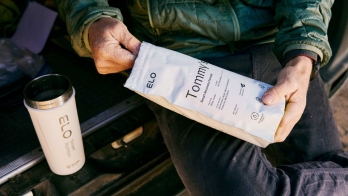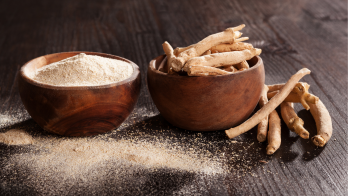The 7 best joint health supplements, according to science
If you’re struggling with inflammation, joint pain, or extreme stiffness, certain supplements may provide some relief. From omega-3s to vitamin C, here are the best science-backed joint health supplements to consider adding to your routine.

Maintaining optimal joint health is essential for leading an active and fulfilling life. Your joints, which connect bones and allow for movement, are subject to wear and tear over time, leading to discomfort, stiffness, and reduced mobility. As a result, the popularity of joint health supplements has skyrocketed, offering a promising solution to alleviate joint-related issues.
Joint health supplements encompass a wide range of products, including vitamins, minerals, herbs, and other natural substances that aim to support joint function, reduce inflammation, and promote overall joint well-being. But are these supplements truly beneficial, and who stands to gain the most from their usage?
Before diving into the research on joint health supplements, let’s first understand what you should look for in supplementation and if you should consider adding them to your routine.
Are joint health supplements beneficial?
Joint pain can affect anyone, but especially athletes, individuals older than 60 years old, women, or those who have arthritis.
In addition to making lifestyle and dietary changes to promote healthy joints (such as doing weight-bearing exercises and eating an anti-inflammatory diet rich in protein), supplementation may also be beneficial, especially for people who are experiencing joint discomfort, COVID joint pain, or are at risk of developing joint issues.
Some evidence suggests supplements like glucosamine, omega-3 fatty acids, curcumin, and vitamin C can support joint health by reducing inflammation and alleviating symptoms of related conditions such as osteoarthritis.
Below we break down the best science-backed joint health supplements worth considering. If you choose to take joint health supplements, look for ones that have been third-party tested
Disclaimer: Supplements aren’t a magic potion for making joint pain disappear or to be used as a substitute for chronic pain medication. To see if joint health supplements are right for you, talk with your healthcare provider before adding anything new to your routine.
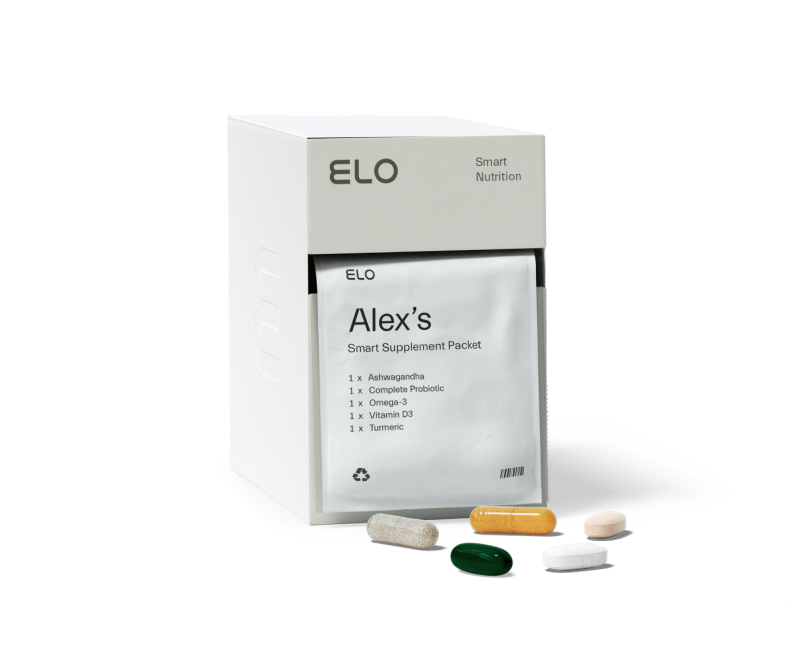
Personalized supplements with Elo Health
At Elo Health 1:1 dietitian support
Elo also provides personalized smart supplements at-home blood testing biomarkers
Start your personalized supplement journey today!

Protein
Protein
Research continues to show the importance of this crucial macronutrient, as it’s been found to promote the repair and growth of muscle tissue, prevent injury, and promote overall strength [ 1
Protein can also be beneficial for maintaining muscle mass loss that comes with aging or osteoarthritis. One study found that people with osteoarthritis who took a protein supplement experienced improvements in muscle mass and strength, reduced pain, better physical mobility, and better global functioning compared to those who didn’t supplement [ 2
Dosing recommendations
The current RDA is 0.8 g protein/kg of body weight/day (g/kg/day) for all adults over 18 years of age, including elderly adults over the age of 65 [ 3 4
If you are an athlete or highly active individual, research shows that you may need 1.2-2.0 g/kg/day, depending on training needs and goals [ 5
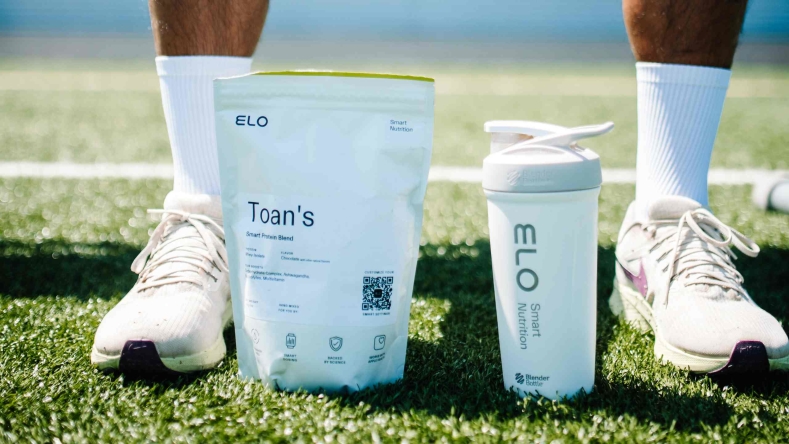
Elo Smart Protein and post-workout recovery
Elo Smart Protein
Elo Smart Protein is also backed by the latest science to help you recover faster and get the most out of every scoop of protein powder. Try it out for yourself today

Collagen
Collagen 6 here
As you age, your body naturally loses collagen, which may increase your risk of degenerative joint disorders such as osteoarthritis [ 7 8 9
Dosing recommendations
Research shows that taking 2.5–15 g of hydrolyzed collagen peptides/day may be safe and effective; however, the amount of collagen you should take depends on the particular supplement and why you’re taking it [ 10
For instance, studies have found doses of 10 g/day of hydrolyzed collagen or 10-40 mg/day of undenatured type II collagen may be beneficial for reducing joint pain associated with osteoarthritis as well as exercise-related joint pain in active adults [ 8 9 11
Precautions
While most people can safely take collagen, individuals with allergies to meat, fish, shellfish, and eggs should avoid collagen supplements made with these ingredients.
Additionally, you may want to hold off on taking a collagen supplement if you’re pregnant or breastfeeding since there isn’t enough research on whether or not they’re safe in these populations [ 12

Vitamin C
Also known as L-ascorbic acid, vitamin C 13
Furthermore, emerging evidence shows that vitamin C plays a role in bone health, as it has the potential to accelerate bone healing after a fracture, increase type I collagen synthesis, boost bone density, and reduce oxidative stress parameters [ 14 15 16
Since your body doesn't naturally produce vitamin C, it’s necessary to obtain it through certain foods and supplements.
Dosing recommendations
The recommended daily amount (RDA) for adults is as follows [ 13
Men and women 9–13 years old: 45 mg/day
Men 14-18 years old: 75 mg/day
Women 14-18 years old: 65 mg/day, with this number increasing to 80 mg/day and 115 mg/day for pregnant and lactating women, respectively.
Men over 19 years old: 90 mg/day
Women over 19 years old: 75 mg/day, with this number increasing to 85 mg/day and 120 mg/day for pregnant and lactating women, respectively.
People who smoke: an additional 35 mg/day than nonsmokers.
Precautions
While many people can tolerate vitamin C, you should talk with your healthcare provider about taking it since it may cause specific drug-nutrient interactions, increase cardiovascular disease risk, or negatively affect iron stores for those with hemochromatosis [ 17 18 19
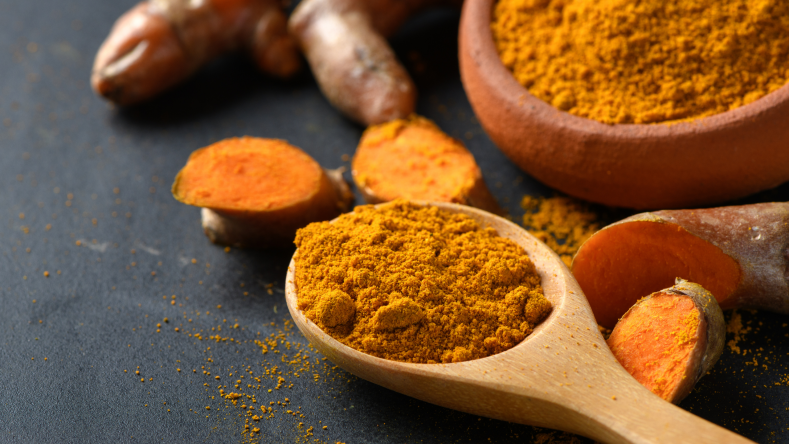
Turmeric and curcumin
Turmeric
Since curcumin has strong anti-inflammatory properties, evidence suggests it can alleviate symptoms of osteoarthritis, improve joint function, and reduce pain and inflammation [ 20 21
Dosing recommendations
You can obtain curcumin through a turmeric supplement. While there is no standard dose for turmeric, the World Health Organization has established 1.4 mg of curcumin/pound of body weight (0–3 mg/kg) as an acceptable daily intake [ 22
Precautions
It’s strongly advised to avoid turmeric supplements if you are pregnant, breastfeeding, have certain conditions (like diabetes, gallstones, gallbladder or kidney disease, bleeding disorders, or immunity problems), have an upcoming surgery, or are taking certain medications.
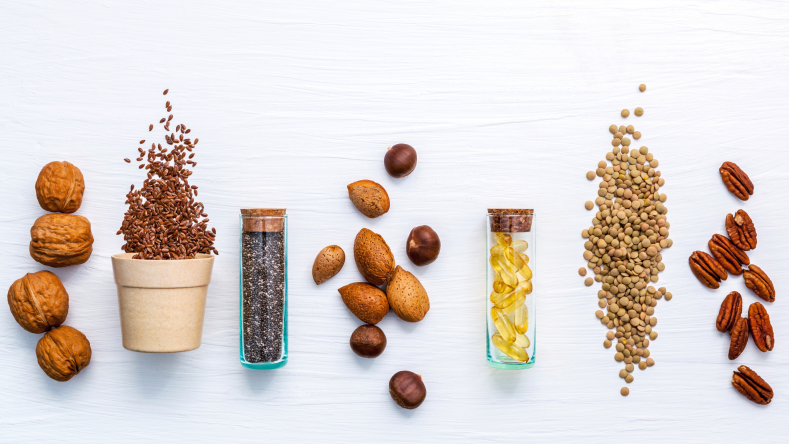
Omega-3s
Omega-3 fatty acids
While these fatty acids are incredibly beneficial for overall health, studies also show that omega-3s are crucial for joint health, as they can reduce swelling and joint tenderness, allow for a better range of motion after exercise, reduce strength loss, and modulate disease activity in rheumatoid arthritis [ 23 24
Dosing recommendations
The daily recommendation for all omega-3s is 1,600 mg/day for men and 1,100 mg/day for women [ 25
Precautions
If you have high triglycerides, it may be best to avoid omega-3 supplements, as they have been associated with an increased likelihood of developing atrial fibrillation.

Tart cherry juice
Tart cherry juice 26
Studies suggest that daily consumption of tart cherry juice may result in better mobility, relief of pain-related symptoms and quality of life, and selective markers of cartilage health [ 27
Dosing recommendations
While the timing and dosage can widely vary, most studies have found that consuming 8-12 oz of tart cherry juice extract twice a day can promote recovery [ 28
Precautions
Because tart cherry juice contains quercetin, it may negatively interact with certain medications, such as blood thinners. Consult a healthcare professional before adding this supplement to your diet [ 29 30
Glucosamine
Glucosamine is an amino sugar compound that is found in cartilage, the tough tissue that cushions your joints [ 31
While it’s most often used to treat pain caused by inflammation and osteoarthritis, studies indicate that glucosamine may also help prevent cartilage breakdown which can be common among endurance athletes [ 32 33 34 35
Dosing recommendations
If you choose to supplement with glucosamine, research suggests 300 – 500 mg three times a day for a total daily dose of 900 – 1,500 mg. While preliminary evidence shows you could slow joint degradation by taking doses as high as 3,000 mg of glucosamine, this may be the most relevant for athletes competing in high-impact sports, like running [ 36
Precautions
While glucosamine is generally safe to take, you may want to avoid this supplement if you have shellfish allergies, have glaucoma, or take warfarin (Coumadin) or acetaminophen (such as Tylenol) [ 37 38
Summary
Joint health is important because joints play a crucial role in your body's mobility and overall functionality. Over time, your joints are subject to wear and tear, which can cause discomfort, stiffness, and reduced range of motion. While athletes, older adults, women, and those with arthritis are more prone to joint pain, this condition can affect anyone at any stage.
You can improve joint health with certain lifestyle and dietary changes. Still, some supplements like protein, collagen, vitamin C, curcumin, omega-3 fatty acids, tart cherry juice, and glucosamine may also improve inflammatory markers and reduce exercise-related joint pain.
If you’re confused about which ones are right for you, Elo Health
Disclaimer: The text, images, videos, and other media on this page are provided for informational purposes only and are not intended to treat, diagnose, or replace personalized medical care.
Key takeaways
Protein, collagen, vitamin C, curcumin, omega-3 fatty acids, tart cherry juice and glucosamine are supplements that may improve inflammatory markers, reduce exercise-related joint pain, and alleviate symptoms of conditions such as osteoarthritis.
In addition to taking supplements, you can
reduce inflammation
and protect your joints through certain lifestyle and dietary changes (such as doing weight-bearing exercises and eating an anti-inflammatory diet rich in protein).Elo Health
offers personalized supplements to address your specific health and wellness concerns.Supplements are not created equal, and may not be recommended for everyone. To see if a supplement is right for you, talk with your healthcare provider before adding anything new to your routine.
References
Pasiakos, S. M., McLellan, T. M., & Lieberman, H. R. (2015). The effects of protein supplements on muscle mass, strength, and aerobic and anaerobic power in healthy adults: a systematic review. Sports medicine (Auckland, N.Z.), 45(1), 111–131.
https://doi.org/10.1007/s40279-014-0242-2
Liao, C. D., Wu, Y. T., Tsauo, J. Y., Chen, P. R., Tu, Y. K., Chen, H. C., & Liou, T. H. (2020). Effects of Protein Supplementation Combined with Exercise Training on Muscle Mass and Function in Older Adults with Lower-Extremity Osteoarthritis: A Systematic Review and Meta-Analysis of Randomized Trials. Nutrients, 12(8), 2422.
https://doi.org/10.3390/nu12082422
Baum, J. I., Kim, I. Y., & Wolfe, R. R. (2016). Protein Consumption and the Elderly: What Is the Optimal Level of Intake?. Nutrients, 8(6), 359.
https://doi.org/10.3390/nu8060359
Bauer, J., Biolo, G., Cederholm, T., Cesari, M., Cruz-Jentoft, A. J., Morley, J. E., Phillips, S., Sieber, C., Stehle, P., Teta, D., Visvanathan, R., Volpi, E., & Boirie, Y. (2013). Evidence-based recommendations for optimal dietary protein intake in older people: A position paper from the Prot-Age Study Group. Journal of the American Medical Directors Association, 14(8), 542–559.
https://doi.org/10.1016/j.jamda.2013.05.021
Carbone, J. W., & Pasiakos, S. M. (2019). Dietary protein and muscle mass: Translating science to application and Health Benefit. Nutrients, 11(5), 1136.
https://doi.org/10.3390/nu11051136
Physiology, Connective Tissue. (n.d.).
https://www.ncbi.nlm.nih.gov/books/NBK542226/
Li, Y.-S., Xiao, W., & Luo, W. (2017). Cellular aging towards osteoarthritis. Mechanisms of Ageing and Development, 162, 80–84.
https://doi.org/10.1016/j.mad.2016.12.012
García-Coronado, J. M., Martínez-Olvera, L., Elizondo-Omaña, R. E., Acosta-Olivo, C. A., Vilchez-Cavazos, F., Simental-Mendía, L. E., & Simental-Mendía, M. (2018). Effect of collagen supplementation on osteoarthritis symptoms: A meta-analysis of randomized placebo-controlled trials. International Orthopaedics, 43(3), 531–538.
https://doi.org/10.1007/s00264-018-4211-5
Clark, K. L., Sebastianelli, W., Flechsenhar, K. R., Aukermann, D. F., Meza, F., Millard, R. L., Deitch, J. R., Sherbondy, P. S., & Albert, A. (2008). 24-week study on the use of collagen hydrolysate as a dietary supplement in athletes with activity-related joint pain. Current Medical Research and Opinion, 24(5), 1485–1496.
https://doi.org/10.1185/030079908x291967
Paul, C., Leser, S., & Oesser, S. (2019). Significant amounts of functional collagen peptides can be incorporated in the diet while maintaining indispensable amino acid balance. Nutrients, 11(5), 1079.
https://doi.org/10.3390/nu11051079
Lugo, J. P., Saiyed, Z. M., & Lane, N. E. (2015). Efficacy and tolerability of an undenatured type II collagen supplement in modulating knee osteoarthritis symptoms: A multicenter randomized, double-blind, placebo-controlled study. Nutrition Journal, 15(1).
https://doi.org/10.1186/s12937-016-0130-8
WebMD. (n.d.). Collagen peptides: Overview, uses, side effects, precautions, interactions, dosing and reviews. WebMD.
https://www.webmd.com/vitamins/ai/ingredientmono-1606/collagen-peptides
U.S. Department of Health and Human Services. (n.d.). Office of dietary supplements - vitamin C. NIH Office of Dietary Supplements.
https://ods.od.nih.gov/factsheets/VitaminC-HealthProfessional/
Chin, K. Y., & Ima-Nirwana, S. (2018). Vitamin C and Bone Health: Evidence from Cell, Animal and Human Studies. Current drug targets, 19(5), 439–450.
https://doi.org/10.2174/1389450116666150907100838
DePhillipo, N. N., Aman, Z. S., Kennedy, M. I., Begley, J. P., Moatshe, G., & LaPrade, R. F. (2018). Efficacy of Vitamin C Supplementation on Collagen Synthesis and Oxidative Stress After Musculoskeletal Injuries: A Systematic Review. Orthopaedic journal of sports medicine, 6(10), 2325967118804544.
https://doi.org/10.1177/2325967118804544
American Bone Health. (2020, February 6). Vitamins for bone health. American Bone Health.
https://americanbonehealth.org/nutrition/vitamins-for-bone-health/
Drug-nutrient interactions. Linus Pauling Institute. (2022, July 6).
https://lpi.oregonstate.edu/mic/drug-nutrient-interactions
Moser, M. A., & Chun, O. K. (2016). Vitamin C and Heart Health: A Review Based on Findings from Epidemiologic Studies. International journal of molecular sciences, 17(8), 1328.
https://doi.org/10.3390/ijms17081328
Dietary guidelines for hemochromatosis - university of virginia school ... (n.d.-a).
https://med.virginia.edu/ginutrition/wp-content/uploads/sites/199/2021/01/Hemochromatosis-2017.pdf
Examine.com. (2023, March 21). Curcumin health benefits, dosage, safety, side-effects, and more: Supplements. Examine.
https://examine.com/supplements/curcumin/
Paultre, K., Cade, W., Hernandez, D., Reynolds, J., Greif, D., & Best, T. M. (2021). Therapeutic effects of turmeric or curcumin extract on pain and function for individuals with knee osteoarthritis: a systematic review. BMJ open sport & exercise medicine, 7(1), e000935.
https://doi.org/10.1136/bmjsem-2020-000935
Amalraj, A., Pius, A., Gopi, S., & Gopi, S. (2017). Biological activities of curcuminoids, other biomolecules from turmeric and their derivatives – a review. Journal of Traditional and Complementary Medicine, 7(2), 205–233.
https://doi.org/10.1016/j.jtcme.2016.05.005
Kostoglou-Athanassiou, I., Athanassiou, L., & Athanassiou, P. (2020). The Effect of Omega-3 Fatty Acids on Rheumatoid Arthritis. Mediterranean journal of rheumatology, 31(2), 190–194.
https://doi.org/10.31138/mjr.31.2.190
Tsuchiya, Y., Yanagimoto, K., Nakazato, K., Hayamizu, K., & Ochi, E. (2016). Eicosapentaenoic and docosahexaenoic acids-rich fish oil supplementation attenuates strength loss and limited joint range of motion after eccentric contractions: a randomized, double-blind, placebo-controlled, parallel-group trial. European journal of applied physiology, 116(6), 1179–1188.
https://doi.org/10.1007/s00421-016-3373-3
U.S. Department of Health and Human Services. (n.d.-a). Office of dietary supplements - omega-3 fatty acids. NIH Office of Dietary Supplements.
https://ods.od.nih.gov/factsheets/Omega3FattyAcids-HealthProfessional/
Kuehl, K. S., Perrier, E. T., Elliot, D. L., & Chesnutt, J. C. (2010). Efficacy of tart cherry juice in reducing muscle pain during running: a randomized controlled trial. Journal of the International Society of Sports Nutrition, 7, 17.
https://doi.org/10.1186/1550-2783-7-17
Du, C., Chapman, S. C., Kwon, Y. H., Vijayagopal, P., & Juma, S. (2019). Impact of Tart Cherry Juice on Joint Flexibility and Pain in Individuals with Self-Reported Knee Osteoarthritis (P01-030-19). Current Developments in Nutrition, 3(Suppl 1), nzz028.P01-030-19.
https://doi.org/10.1093/cdn/nzz028.P01-030-19
Vitale, K. C., Hueglin, S., & Broad, E. (2017). Tart Cherry Juice in Athletes: A Literature Review and Commentary. Current sports medicine reports, 16(4), 230–239.
https://doi.org/10.1249/JSR.0000000000000385
Kim, D. W., Jung, D. H., Sung, J., Min, I. S., & Lee, S. J. (2021). Tart Cherry Extract Containing Chlorogenic Acid, Quercetin, and Kaempferol Inhibits the Mitochondrial Apoptotic Cell Death Elicited by Airborne PM10 in Human Epidermal Keratinocytes. Antioxidants (Basel, Switzerland), 10(3), 443.
https://doi.org/10.3390/antiox10030443
Andres, S., Pevny, S., Ziegenhagen, R., Bakhiya, N., Schäfer, B., Hirsch-Ernst, K. I., & Lampen, A. (2018). Safety Aspects of the Use of Quercetin as a Dietary Supplement. Molecular nutrition & food research, 62(1), 10.1002/mnfr.201700447.
https://doi.org/10.1002/mnfr.201700447
National Center for Biotechnology Information (2023). PubChem Compound Summary for CID 439213, D-Glucosamine. Retrieved June 8, 2023 from
https://pubchem.ncbi.nlm.nih.gov/compound/D-Glucosamine
.Jerosch J. (2011). Effects of Glucosamine and Chondroitin Sulfate on Cartilage Metabolism in OA: Outlook on Other Nutrient Partners Especially Omega-3 Fatty Acids. International journal of rheumatology, 2011, 969012.
https://doi.org/10.1155/2011/969012
Nagaoka, I., Tsuruta, A., & Yoshimura, M. (2019). Chondroprotective action of glucosamine, a chitosan monomer, on the joint health of athletes. International journal of biological macromolecules, 132, 795–800.
https://doi.org/10.1016/j.ijbiomac.2019.03.234
Ostojic, S. M., Arsic, M., Prodanovic, S., Vukovic, J., & Zlatanovic, M. (2007). Glucosamine administration in athletes: effects on recovery of acute knee injury. Research in sports medicine (Print), 15(2), 113–124.
https://doi.org/10.1080/15438620701405248
Ogata, T., Ideno, Y., Akai, M., Seichi, A., Hagino, H., Iwaya, T., Doi, T., Yamada, K., Chen, A. Z., Li, Y., & Hayashi, K. (2018). Effects of glucosamine in patients with osteoarthritis of the knee: a systematic review and meta-analysis. Clinical rheumatology, 37(9), 2479–2487.
https://doi.org/10.1007/s10067-018-4106-2
Examine.com. (2022, September 28). Glucosamine health benefits, dosage, safety, side-effects, and more: Supplements. Examine.
https://examine.com/supplements/glucosamine
U.S. Department of Health and Human Services. (n.d.). Glucosamine and chondroitin for osteoarthritis. National Center for Complementary and Integrative Health.
https://www.nccih.nih.gov/health/glucosamine-and-chondroitin-for-osteoarthritis
Mayo Foundation for Medical Education and Research. (2020, November 12). Glucosamine. Mayo Clinic.
https://www.mayoclinic.org/drugs-supplements-glucosamine/art-20362874



